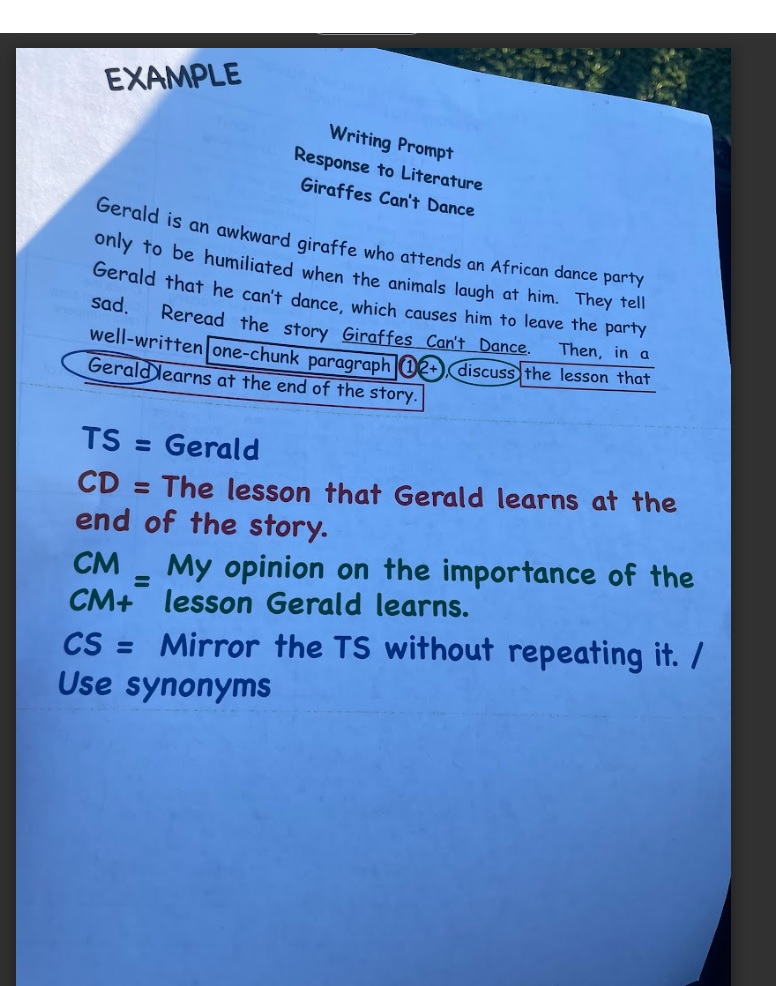"I Don't Know How to Start!": Teaching Students How to Decode the Prompt
Good evening, Dr. Louis,
I have attached an example prompt that one of our teachers decoded. Would you please review it and provide some feedback? I have looked it over myself, but I want to be sure that my feedback is in alignment with the expectations of JSWP. How would this decoded prompt score on the Decoding the Prompt Rubric?
Thank you,
Desiree A.

Dear Desiree,
Thank you for reaching out to me. If students don’t know how to decode their writing prompts, then they are doomed from the beginning. “Decoding the Prompt” is one of the most important skills in writing. And, as students move into middle school, high school, and college, the prompts will become more difficult. So, starting now in elementary school makes me happy and proud.
I can tell that the teacher put much effort into this; the main error was the determination of CD, which affected the determination of CM. The score would be 8/12. See the attached rubric.
Here are my recommendations for honing this skill:
- THE TITLE. Is it a short story or a novel? If it's a short story, put quotations around the title at the top and in the prompt. If it is a novel, underline both places. Also, include the author. Students need to know how to include authors' names in their responses.
- THE BACKGROUND SENTENCE(S)
* Gerald is an awkward giraffe who attends an African dance party.
Stop there.
* I caution teachers to avoid providing analysis in the background sentence(s). Sometimes, in our attempt to guide the students, we give them the answers, and then they have nowhere to go, or they simply repeat the prompt.
* You're looking for students to develop an understanding of tone (humiliation and confidence) to answer the question about the lesson. Don't tell them; let them show you!
* I especially like your background sentence for its diction and opportunity for a grammar lesson. Let me explain:
- "awkward" and "attends" - When teachers model good word choice, it helps students learn new vocabulary and how it is placed in a sentence.
- Proper Nouns - The first sentence also teaches students about the proper noun "African."
- Grammar and diction should be modeled. Good work!
- THE TASK
* I'm wondering if this writing assignment needs to be two one-chunk paragraphs: 1) At the party with the conflict, and 2) after the party where the lesson is learned.
- MAPPING
* CD = Your teacher wrote, "The lesson that Gerald learns at the end of the story." This is incorrect. Remember, CD is plot summary in Response to Literature. So, what happens in the story.
* CM - The lesson he learns and the importance of that lesson could be the CS.
Also, the teacher might be trying to do too much in the confinements of a one-chunk paragraph. The teacher might receive better results if she 1) asks for a one-chunk paragraph for only the beginning of the story when Gerald feels humiliated; or 2) asks for two one-chunk paragraphs in which the students show the progression of the story and the lesson learned.
TS = Gerald doesn’t quite fit in.
CD = He attends a party, and when he dances, the other animals laugh at him. (plot)
CM = Tone / He feels sad.
CM = Tone / He wants to be appreciated for who he is.
CS =Everyone wants to be liked.
TS = After the party, Gerald learns an important lesson.
CD = What actually happens (no commentary – plot summary only)
CM = Tone –What is Gerald’s attitude now?
CM= What is the lesson of the story?
CS = Why is this lesson important for all people to learn?
Another idea: if the teacher doesn’t want the students to write two paragraphs, then she could write the first one as a model, and the students could write the second one. This sample is a good beginning, and I’m so grateful that you are sharing, so we can look at this skill closely.
Keep reading and writing!
D





